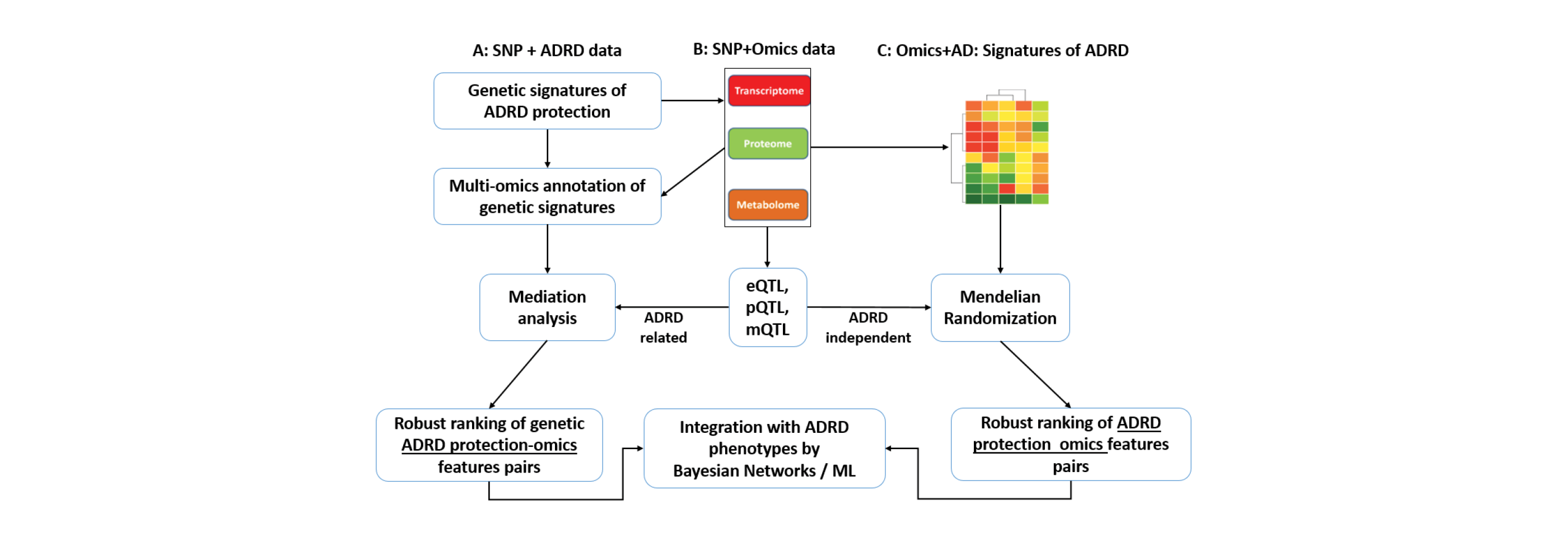
Overview
Extreme longevity (EL) is influenced by combinations of gene variants that may hold the explanation of why and how many centenarians and their offspring reach extreme old ages with good cognitive function and delay or even escape Alzheimer’s disease and related dementias (ADRD). In the previous cycle of the Longevity Consortium (LC), we established the LC Centenarian (LCC) study and we enrolled more than 400 centenarians and their offspring. Our genetic analyses identified new EL associated genes including genes that correlate with protection from ADRD. We generated proteomic and metabolomic signatures of age, extreme old age, and survival that revealed a snapshot of the complexity of molecular aging and EL, and we demonstrated that longevity variants have distinct and well-replicated proteomic and metabolomic signatures that may help prioritize targets for healthy aging therapeutics. These results provide strong evidence that genes related to EL, CI, and ADRD have intertwined effects that we aim to dissect and characterize. We will expand this work by augmenting our existing collection of genome-wide genotype data with new multi-omics data, further our analyses of EL with new genetic data, characterize genetic and associated multi-omics signatures that correlate with EL and protect centenarians and their offspring from CI and ADRD, and examine the effects of sex, race and genetic diversity on these associations. The analyses in Project 3 will clarify the relationships between factors related to EL and factors influencing CI and risk or severity of ADRD and specifically address Objective 3 of the RFA: “Clarify the relationships between factors related to exceptional longevity in humans and factors influencing cognitive function in old age and risk or severity of Alzheimer’s disease and related dementias”.

Co-Leads
Professor of Medicine
Boston University Chobanian and Avedisian School of Medicine
Thomas Perls MD, MPH is Professor of Medicine and Geriatrics at the Boston University Chobanian and Avedisian School of Medicine. He is director of the New England Centenarian Study, the largest study of centenarians and their family members in the world that he founded in 1993. Dr. Perls focuses on the epidemiology and determinants of exceptional longevity and healthspan.
Tufts Medicine
Paola Sebastiani, PhD, is director of the Center on Quantitative Methods and Data Science and co-director of the Institute for Clinical Research and Health Policy Studies. She is also director of the Biostatistics, Epidemiology and Research Design Center, Tufts CTSI, and Professor of Medicine at Tufts University School of Medicine. Dr. Sebastiani is a multidisciplinary biostatistician, with a track record of innovations in Bayesian statistics, machine learning and artificial intelligence. In addition to leading the centenarian project, she is multiple PI of the Integrative longevity Omics and of the Long Life Family Study.
Other Key Personnel
Assistant Professor of Medicine
Boston University Chobanian & Avedisian School of Medicine
Stacy Andersen, PhD is an Assistant Professor of Medicine at Boston University Chobanian & Avedisian School of Medicine and co-director of the New England Centenarian Study. As a behavioral neuroscientist, her research focuses on characterizing cognitive profiles of older adults, identifying factors associated with resilience to Alzheimer’s disease among centenarians and their family members, and developing novel methods of detecting cognitive change using digital technologies and behavioral features of cognitive test performance.
Associate Professor
Oregon State University
Harold Bae, PhD, MS is an Associate Professor at Oregon State University whose research is focused on statistical genetics and genetic epidemiology. His primary research goal is to understand the genetic architecture of human extreme longevity and sub-phenotypes of longevity and to develop advanced statistical modeling of genetic data to elucidate the genetic basis of complex polygenic traits.
Professor of Medicine, Biostatistics, and Bioinformatics
Boston University
Stefano Monti, PhD is a Professor of Medicine, Biostatistics, and Bioinformatics at Boston University. His research integrates systems biology, machine learning, and bioinformatics to investigate the molecular drivers of human disease through the generation and analysis of high-throughput multi-omics data, with the goals of advancing prevention and care. Areas of research include the study of the biological factors contributing to healthy aging and extreme longevity, and the study of age-associated mechanisms of tumor initiation and progression.
Research Associate Professor
Institute for Systems Biology
Noa Rappaport, PhD is a Research Associate Professor at the Buck Institute for Research on Aging, Chief Data Officer at Phenome Health, and Principal Scientist at the Institute for Systems Biology. She leads research in computational biology and multi-omic analysis, using and developing methods to study complex biological systems exploring aging biology, Alzheimer’s disease, and metabolic health through multi-omic data integration.
Assistant Professor
Tufts University School of Medicine
Meghan Short, PhD is an Assistant Professor in the Center for Quantitative Methods and Data Science in the Institute for Clinical Research and Health Policy Studies (ICRHPS) at Tufts Medical Center on March 1. Her research interests include methods development for analysis of ‘omics data (with a particular interest in the microbiome) and working with data from longitudinal observational studies.
Team Members
